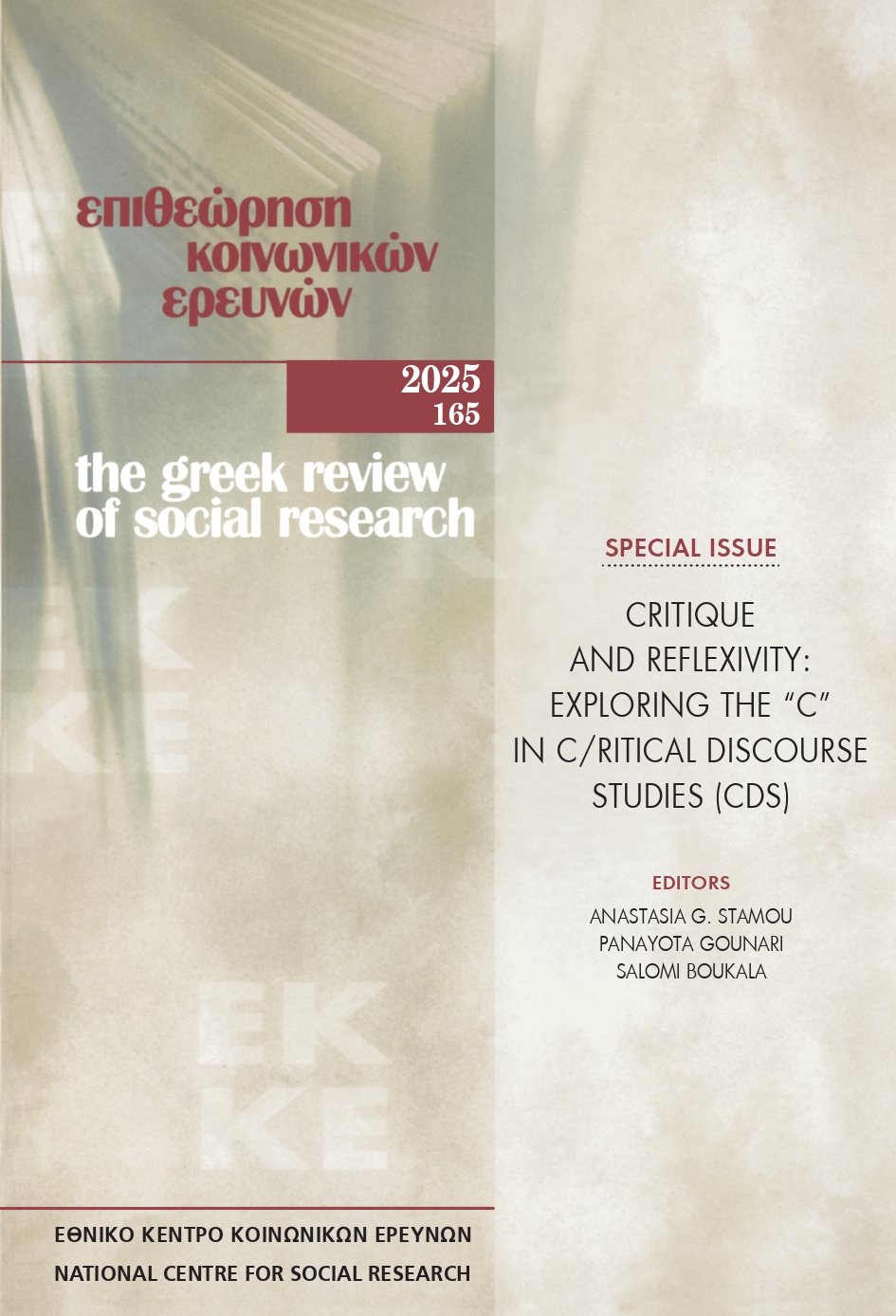Διερευνώντας την Kριτική στις κριτικές προσεγγίσεις της γλωσσικής εκπαίδευσης

Περίληψη
Το άρθρο διερευνά την έννοια της κριτικής σε τέσσερις προσεγγίσεις στη γλωσσική εκπαίδευση: την κριτική σκέψη, την κριτική παιδαγωγική, τον κριτικό γραμματισμό και την κριτική γλωσσική επίγνωση. Εξετάζονται οι θεωρητικές αρχές, οι επιστημολογικές παραδοχές και οι παιδαγωγικοί στόχοι κάθε προσέγγισης, και αναδεικνύονται οι συγκλίσεις και οι μεταξύ τους διαφορές. Ιδιαίτερη προσοχή δίνεται στους τύπους μαθητών και πολιτών που επιδιώκει να καλλιεργήσει κάθε προσέγγιση. Η ανάλυση καλεί σε προβληματισμό σχετικά με το πώς νοηματοδοτείται και εφαρμόζεται η έννοια της κριτικής σε διαφορετικά εκπαιδευτικά πλαίσια, προσφέροντας χρήσιμες επισημάνσεις για μια συνεκτικότερη και πιο μετασχηματιστική πρακτική στη διδασκαλία της γλώσσας.
Λεπτομέρειες άρθρου
- Πώς να δημιουργήσετε Αναφορές
-
Mitsikopoulou, B. (2025). Διερευνώντας την Kριτική στις κριτικές προσεγγίσεις της γλωσσικής εκπαίδευσης. Επιθεώρηση Κοινωνικών Ερευνών, 165, 123–158. https://doi.org/10.12681/grsr.42211
- Ενότητα
- Άρθρα

Αυτή η εργασία είναι αδειοδοτημένη υπό το CC Αναφορά Δημιουργού – Μη Εμπορική Χρήση 4.0.
Οι συγγραφείς των άρθρων που δημοσιεύονται στην Επιθεώρηση Κοινωνικών Ερευνών διατηρούν τα δικαιώματα πνευματικής ιδιοκτησίας επί των άρθρων τους, δίνοντας στο περιοδικό το δικαίωμα της πρώτης δημοσίευσης. Άρθρα που δημοσιεύονται στην Επιθεώρηση Κοινωνικών Ερευνών διατίθενται με άδεια Creative Commons 4.0 και σύμφωνα με την άδεια μπορούν να χρησιμοποιούνται ελεύθερα, με αναφορά στο/στη συγγραφέα και στην πρώτη δημοσίευση για μη κερδοσκοπικούς σκοπούς.
Το Εθνικό Κέντρο Κοινωνικών Ερευνών διατηρεί το δικαίωμα να δημοσιεύει, να αναπαραγάγει, να παρουσιάζει στο κοινό, να διανέμει και χρησιμοποιεί άρθρα που δημοσιεύονται στην Επιθεώρηση Κοινωνικών Ερευνών σε οποιοδήποτε μέσο και μορφή είτε μεμονωμένα είτε ως μέρη συλλογικών έργων, για όλο τον χρόνο διάρκειας προστασίας της πνευματικής ιδιοκτησίας και για όλες τις χώρες του κόσμου. Αυτό περιλαμβάνει ενδεικτικά και όχι αποκλειστικά το δικαίωμα δημοσίευσης των άρθρων σε τεύχη της Επιθεώρησης Κοινωνικών Ερευνών, αναπαραγωγής και διανομής μεμονωμένων αντιγράφων των άρθρων, αναπαραγωγής ολόκληρων των άρθρων σε άλλη έκδοση του Εθνικού Κέντρου Κοινωνικών Ερευνών, καθώς και αναπαραγωγής και διανομής των άρθρων ή περίληψης αυτών με χρήση πληροφορικού συστήματος αποθετηρίου.


